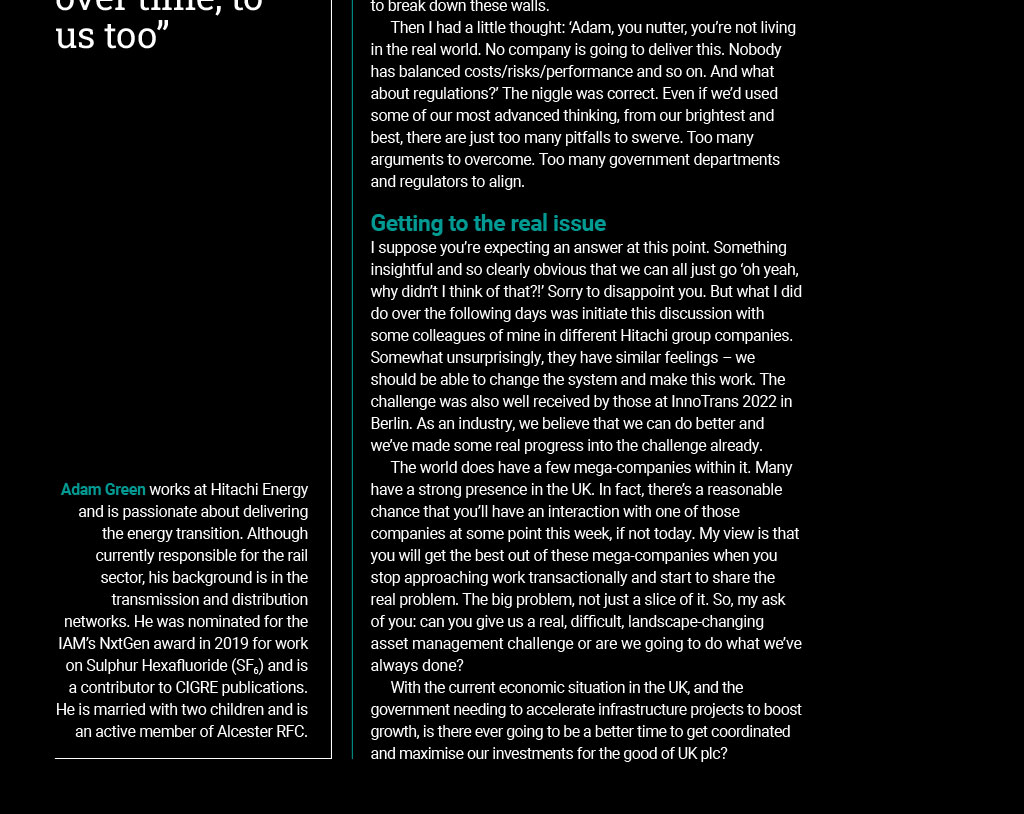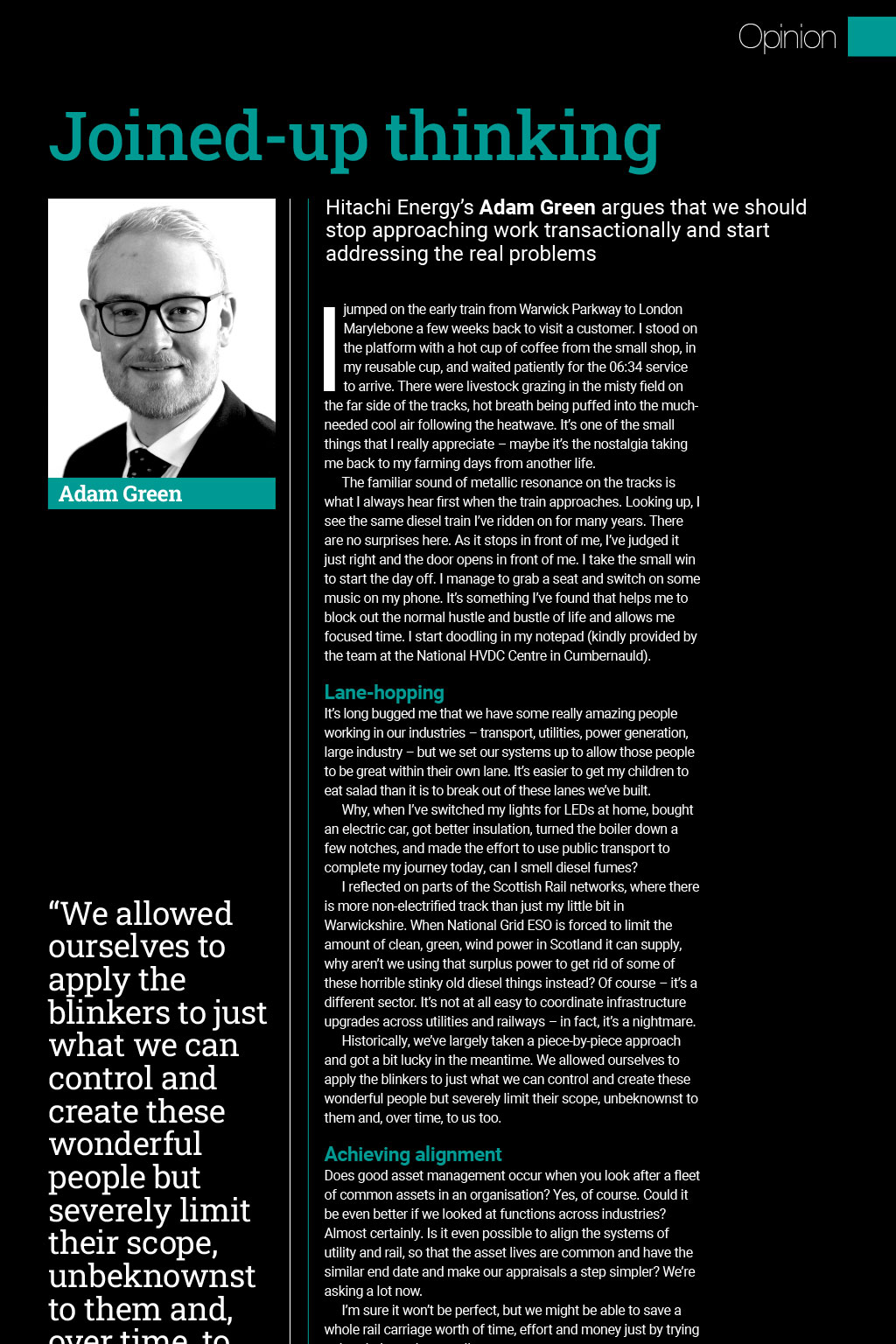




Opinion Joined-up thinking Hitachi Energys Adam Green argues that we should stop approaching work transactionally and start addressing the real problems I Adam Green jumped on the early train from Warwick Parkway to London Marylebone a few weeks back to visit a customer. I stood on the platform with a hot cup of coffee from the small shop, in my reusable cup, and waited patiently for the 06:34 service to arrive. There were livestock grazing in the misty field on the far side of the tracks, hot breath being puffed into the muchneeded cool air following the heatwave. Its one of the small things that I really appreciate maybe its the nostalgia taking me back to my farming days from another life. The familiar sound of metallic resonance on the tracks is what I always hear first when the train approaches. Looking up, I see the same diesel train Ive ridden on for many years. There are no surprises here. As it stops in front of me, Ive judged it just right and the door opens in front of me. I take the small win to start the day off. I manage to grab a seat and switch on some music on my phone. Its something Ive found that helps me to block out the normal hustle and bustle of life and allows me focused time. I start doodling in my notepad (kindly provided by the team at the National HVDC Centre in Cumbernauld). Lane-hopping We allowed ourselves to apply the blinkers to just what we can control and create these wonderful people but severely limit their scope, unbeknownst to them and, over time, to us too Its long bugged me that we have some really amazing people working in our industries transport, utilities, power generation, large industry but we set our systems up to allow those people to be great within their own lane. Its easier to get my children to eat salad than it is to break out of these lanes weve built. Why, when Ive switched my lights for LEDs at home, bought an electric car, got better insulation, turned the boiler down a few notches, and made the effort to use public transport to complete my journey today, can I smell diesel fumes? I reflected on parts of the Scottish Rail networks, where there is more non-electrified track than just my little bit in Warwickshire. When National Grid ESO is forced to limit the amount of clean, green, wind power in Scotland it can supply, why arent we using that surplus power to get rid of some of these horrible stinky old diesel things instead? Of course its a different sector. Its not at all easy to coordinate infrastructure upgrades across utilities and railways in fact, its a nightmare. Historically, weve largely taken a piece-by-piece approach and got a bit lucky in the meantime. We allowed ourselves to apply the blinkers to just what we can control and create these wonderful people but severely limit their scope, unbeknownst to them and, over time, to us too. Achieving alignment Does good asset management occur when you look after a fleet of common assets in an organisation? Yes, of course. Could it be even better if we looked at functions across industries? Almost certainly. Is it even possible to align the systems of utility and rail, so that the asset lives are common and have the similar end date and make our appraisals a step simpler? Were asking a lot now. Im sure it wont be perfect, but we might be able to save a whole rail carriage worth of time, effort and money just by trying to break down these walls. Then I had a little thought: Adam, you nutter, youre not living in the real world. No company is going to deliver this. Nobody has balanced costs/risks/performance and so on. And what about regulations? The niggle was correct. Even if wed used some of our most advanced thinking, from our brightest and best, there are just too many pitfalls to swerve. Too many arguments to overcome. Too many government departments and regulators to align. Getting to the real issue Adam Green works at Hitachi Energy and is passionate about delivering the energy transition. Although currently responsible for the rail sector, his background is in the transmission and distribution networks. He was nominated for the IAMs NxtGen award in 2019 for work on Sulphur Hexafluoride (SF6) and is a contributor to CIGRE publications. He is married with two children and is an active member of Alcester RFC. I suppose youre expecting an answer at this point. Something insightful and so clearly obvious that we can all just go oh yeah, why didnt I think of that?! Sorry to disappoint you. But what I did do over the following days was initiate this discussion with some colleagues of mine in different Hitachi group companies. Somewhat unsurprisingly, they have similar feelings we should be able to change the system and make this work. The challenge was also well received by those at InnoTrans 2022 in Berlin. As an industry, we believe that we can do better and weve made some real progress into the challenge already. The world does have a few mega-companies within it. Many have a strong presence in the UK. In fact, theres a reasonable chance that youll have an interaction with one of those companies at some point this week, if not today. My view is that you will get the best out of these mega-companies when you stop approaching work transactionally and start to share the real problem. The big problem, not just a slice of it. So, my ask of you: can you give us a real, difficult, landscape-changing asset management challenge or are we going to do what weve always done? With the current economic situation in the UK, and the government needing to accelerate infrastructure projects to boost growth, is there ever going to be a better time to get coordinated and maximise our investments for the good of UK plc?